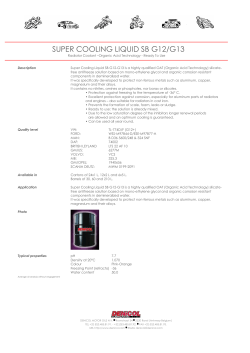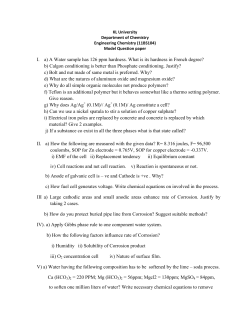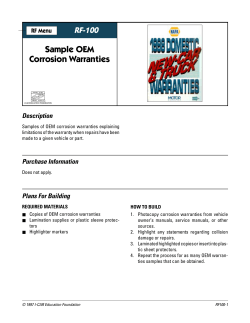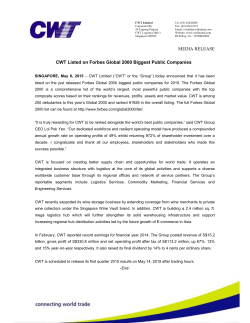
Selecting a Water Treatment Service Provider To Meet Green Technology Requirements
Selecting a Water Treatment Service Provider To Meet Green Technology Requirements By: Jay Farmerie, CWT, President, Cyrus Rice Water Selecting a water treatment company is very important in todayʼs environment. It is every facilityʼs desire to also become greener in their technology by reducing their use of our earthʼs natural resources. In most facilities the biggest user of energy and water are heating and cooling water systems. To limit the use of energy, it is important to have a good water treatment program to keep these systems free of scale, deposits, corrosion and microbiological growth. Scale and deposits decrease heat transfer efficiency which will increase use of natural gas, fuel oil or electricity. Corrosion can cause equipment to operate inefficiently and microbiological growth can cause disease and fouling. Thus water treatment is an environmentally friendly process. Another aspect of water treatment is to try to limit the use of water. This could include running higher cycles or recovering and reusing possible waste streams which will ultimately save the facility money. A key part of the water treatment process includes selecting the right water treatment professional who can work with the facility to accomplish these goals. Normally, this can be done in many different ways, such as requests for proposals (RFP), requests for quotes (RFQ), bid submittals, personal interviews or even personal relationships. Whichever of these methods the facility manager uses, it is necessary to develop criteria for deciding what kind of service is needed to protect the cooling and/or heating equipment from failure or unexpected shutdowns that can cost the facility in lost revenue and increase utility costs. Selecting the Level of Service The facility manager must first decide what type of service the facility requires. There are basically three levels of service: 1) Services designed to ensure proper application of the water treatment program. The water treatment company provides a product and instructs the facility on how to operate within the specified limits of the system. In this case, the water treatment provider is strictly a chemical supplier and not a true service provider. This level of service is the cheapest, but it is not a good option if the facility does not have: • full-time experienced operators who cover all shifts, understand water treatment and need no training; • a full-time engineering staff that can work on water related problems; or • a water consultant on retainer who can provide help when it is needed. 2) Services designed not only to provide treatment products, but also to ensure adequate protection against corrosion, deposition and microbiological growth. This level of service is the standard for a fullservice supplier, requiring the service representative to monitor the systemʼs performance by periodic checks. These checks include water testing, corrosion coupons, microbiological testing and deposition analysis. Water Testing should include all the characteristics to determine the standard scaling indices, inhibitor levels and corrosion by-products for the system metallurgy. Microbiological testing can include bacterial dip-slides, ATP (adenosine tri-phosphate) and anaerobic bacteria testing. Corrosion coupon analyses should be done continually with either coupons or by linear polarization. Deposition analysis is done to understand any deposits and the causes of their formation. In addition, pre-treatment systems, where no chemical treatment is utilized, yet which can impact the performance of heat exchange equipment, also need to be monitored by the water treatment professional. Illustrations of this type of equipment are water softeners, demineralizers, Reverse Osmosis, EDI, make-up water, etc. Such a basic program may also include assistance in solving minor problems, but frequently does not if the service provider or representative is inexperienced. 3) Service that includes levels 1 & 2 above and also includes the initiation of projects to optimize system performance and reduce energy or utility costs, reduce water or sewage costs, increase water reuse or decrease chemical usage. Such a program is the highest level of service and attention and can only be supplied by an experienced water treatment professional with full commitment and support from his or her corporate technical staff and laboratories. We call this a provider who provides value added service. This decision on the type of water treatment service required by a facility is important because, as demonstrated in the chart below, the biggest factor in controlling costs is not chemical consumption, but utility usage. This correlates well with getting LEED points and becoming green in your facility. Cost Factors in a Process Cooling System Setting Qualification Criteria Once the facility has identified the appropriate type of service required, the manager must set qualification criteria for the water treatment provider. Can they provide the service needed in a timely manner, provide electronic and written service reports on an agreed upon frequency, maintain proper inventory of products (“just in time delivery” is not acceptable), provide 24-hour response, proactively work with the facility as a partner and be concerned about the performance of all the systems? Do they have the knowledge to reduce the facilityʼs carbon footprint? Can they provide the client with projects and their Return on Investments (ROI) to allow the facility to save money? The company that is selected must also support their water treatment professionals with the latest information including feed and treatment equipment, testing techniques, regulatory information and back-up technical personnel, if necessary. Considering the Water Treatment Professional Selecting a water treatment company is also about selecting the water treatment professional assigned to be responsible for the treatment program. When reviewing an individual, the facility manager should consider factors such as education, experience, integrity and the personality of the water treatment professional who would be interacting with the personnel at the facility. Education The education level can be measured in several ways. What is the highest level of formal education? Is the professionalʼs education in the area of intended use? Knowledge about the types of systems that they will be dealing with is imperative. Has the individual received continuing education through their company or other training that has provided them with an understanding of the operation, maintenance and treatment of water based systems? Do they understand the concepts of external treatment, corrosion and deposition control, biological control, system performance management, data trending, feed and control systems, safety and regulatory matters, and budgetary issues? All of these subjects need to be understood by an acceptable water treatment professional. Experience The experience level of an individual is not just the number of years a person has been in the business. It is much more. • Do they have experience with various systems, especially the ones for which they will be responsible? • Do they understand the key performance indicators (KPIʼs)? • Can they identify areas that need immediate attention to prevent equipment damage, eliminate a possible environmental incident or avoid a potentially unsafe condition? • Have they helped other facilities reduce their carbon footprint or reduced utility usage? • Do they have experience in zero liquid discharge or reusing process or waste streams in cooling towers, boilers or other heat exchange equipment? Integrity and Personality Why should the facility manager evaluate the integrity and personality of the individual? They will work closely with this individual to ensure the facility operates as efficiently as possible. If the water treatment professional listens to them and their concerns, participates in team decision making efforts, provides good feedback and is comfortable to be around, then the program will be monitored more closely and operation personnel will work more effectively with the individual to keep the system functional. Ethics and integrity are also important. Is the individual concerned about the facilityʼs systems mainly because doing so provides them a means to sell their services and receive a paycheck or are they actually concerned with improving the performance of the systems, reducing costs, maximizing the conservation of environmental resources and partnering with the facility to achieve these goals? Simplifying the Selection Process There is a program that simplifies the search for the right water treatment professional. The Certified Water Technologist (CWT) credential from the Association of Water Technologies (AWT) was established to provide the water treatment industry with a designation representing a level of knowledge, extensive professional experience and education in all aspects of water treatment and technology. Every CWT has signed a Declaration of Ethics, proclaiming an obligation to honesty, integrity, safety, service excellence, and a commitment to conservation of resources. The CWT credential is one way to ensure that the water treatment professional is qualified to provide the facility with the highest quality of service possible. Demand that the water treatment professional that is hired has this credential. Developing Performance Checks Once the facility manager has considered the qualifications of a water treatment company and its professionals, the final step in the process is to develop precise performance checks that will allow an understanding of how the systems are working. This type of criteria is often developed with the help of those members of the facilityʼs engineering staff who have specific knowledge about the systems. They should know which pieces of equipment are critical to the facilityʼs operation. These could include heat exchangers, condensers, boilers, cooling towers, etc. The water treatment professional should help the client company develop the criteria to understand characteristics of the equipment such as temperature differentials or flows that need to be maintained, boiler efficiency, maximum stack temperatures, scaling or fouling factors at which the equipment can still operate effectively, mass balance data to understand how a system is operating, system materials/metallurgy and maximum tolerable corrosion rates for each. One of the most important system checks is defining bacterial growth limitations to limit fouling and prevent the cooling water systems from becoming a disease source. The Big Picture The task of selecting the right water treatment service provider should not be taken lightly. Selecting the right partner can improve a facilityʼs operational performance and control the operating budget for items such as electricity, gas, water and sewage. Moreover, developing a relationship with the service provider will allow for proper protection of the cooling equipment against failure or unexpected shutdowns and ensure that day-to-day operations continue and also allow the facility to meet todayʼs green technology demands. Jay Farmerie, CWT Mr. Farmerie has been in the water treatment field for more than 25 years. He is a Past President of the Association of Water Technologies and is a Senior Consultant for Cyrus Rice Water Consultants, an independent water treatment consulting and engineering firm in Pittsburgh, PA and a recipient of the AWTʼs prestigious Ray Baum Memorial Award. Cyrus Rice also has written performance specifications for many facilities desiring to improve their water treatment program. For more information, visit www.cyrusrice.com. About AWT AWT is an international trade association representing over 500 companies that specialize in industrial and commercial water treatment for heating and cooling systems. These companies may also specialize in wastewater treatment, potable water treatment, and other industry segments. For additional information about AWT, please visit our web site at www.awt.org or call our headquarters at (301) 740-1421.
© Copyright 2025





















